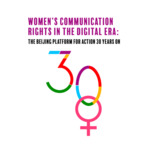 | WomComRights25: Women’s Communication Rights in the Digital Era: the Beijing Platform for Action 30 Years on NOVA FCSH Lisbon, Portugal, September 18-19, 2025 |
| Conference website | https://womcomrights25.fcsh.unl.pt |
| Submission link | https://easychair.org/conferences/?conf=womcomrights25 |
| Submission deadline | January 31, 2025 |
| Organization | ICNOVA – NOVA Institute of Communication and ECREA Gender, Sexuality and Communication Section |
International Conference
Thursday 18th & Friday 19th September 2025
ICNOVA – NOVA Institute of Communication and
ECREA Gender, Sexuality and Communication Section
Lisbon, Portugal
In 2025, we celebrate the 30th anniversary of the Beijing Platform for Action (BPfA), an international policy framework adopted at the Fourth UN World Conference on Women in 1995, which established global objectives for advancing gender equality. Section J deals with gender equality in the media and calls for the participation of women in media roles and a balanced, non-stereotypical portrayal of women. It took decades of feminist activism to include Section J in the Platform. These initiatives led to the launch of the Global Media Monitoring Project, a comprehensive analysis of the portrayal of women in the news in different countries.
Despite this foundation, gender and intersectional inequalities still exist. The media landscape of the last 30 years has seen a concentration of ownership, a decline in budgets for journalism, the rise of large tech companies and a challenging regulatory environment — all of which emphasise the need for initiatives on gender and intersectionality in the media. Although Section J advocates for women’s participation, stereotypical representations are still prevalent and women are often excluded from media decision-making processes. Gender-based violence online has increased as digital platforms have failed to effectively combat misogyny and protect women’s digital rights. This has added new forms of abuse, especially for those belonging to different minority groups and facing other forms of discrimination such as ableism, racism, lgtbqphobia, aporophobia, classism or ageism.
At a time when rights are under threat, it is necessary to continue to develop strategies for action and exchange ideas on methods to support demands for a fairer media environment. This conference aims to foster a dialogue on changes, challenges and future directions in realising gender and intersectional equality in the media.
Format
We invite scholars, policymakers, journalists, media professionals and activists to submit a contribution on topics such as feminist media policy, digital harassment, intersectional discrimination, media representation and the role of feminist movements in shaping media policy or other topics mentioned below. Contributions dealing with intersectional and comparative approaches to media and gender issues are particularly welcome. Presentations can be inspired by research, creative, media, activist, and interdisciplinary practices and will be arranged in thematic sessions by the organising team.
Potential topics could include (but are not limited to):
- The role of feminist movements in media and gender policy-making
- Gender and media regulation
- Online gendered harassment and abuse
- Gender and intersectional issues in media production
- Manifestations of misogyny in digital and popular media
- Gendered implications of AI / automated technologies and algorithmic communications
- Intersections of sexism, ableism, racism, lgtbqphobia, ageism, classism and other forms of oppression
- Shortcomings and possibilities of the Beijing Platform for Action
- Pervasiveness of (neo)colonial framings in the global representation of women
- The role of affect, emotion, and authenticity within gender and communication
- Disinformation, misinformation, malinformation and threats to gender and intersectional equality
- Far-right communication, social media and women’s rights
- Alternative feminist media practices
- Possibilities for building solidarity in and through the media, especially within the Global South and the Global North
- Specific policy issues such as privacy, surveillance, issues of data justice and others
- Feminist utopias in media production and representation.
Please submit your proposal by 31st January 2025, 23:59 (CET) and highlight how your work relates to the conference topic, methods used, and perspectives you would like to bring to the discussion. Abstracts should be no longer than 300 words.
Registration
The cost of (in-person) attendance is 100 euros for salaried academics and other professionals, and 50 euros for students and unwaged participants. Requests for fee exemption will be handled case-by-case by the organizing committee.
This covers conference registration and coffee breaks. Booking for the conference dinner will be available once registration is opened.
Organisation
This conference is co-organised by ICNOVA (Lisbon) and ECREA’s Gender, Sexuality and Communication Section with the support of the Digital Culture and Communication Section. The conference is partially supported by National Funds through FCT - Foundation for Science and Technology under Project refª: UIDB/05021/2020.
Hosted and sponsored by ICNOVA (Universidade NOVA de Lisboa).
For questions, please email us at WomComRights25@fcsh.unl.pt
